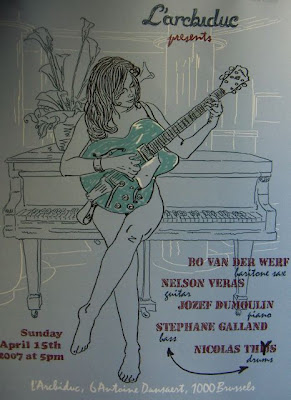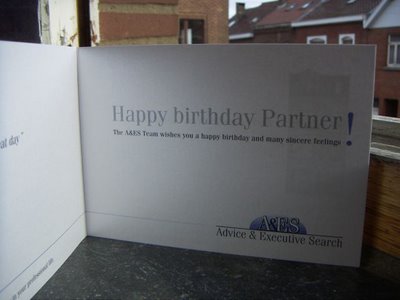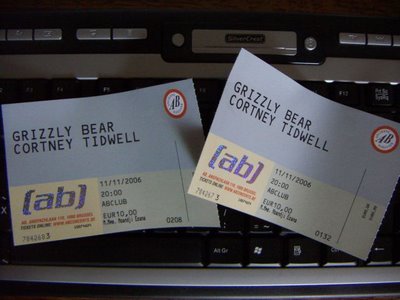Mikkel Ploug Group ft. Mark Turner - 07/10/2007@L'Archiduc, Bruxelles

Mark Turner - ts
Mikkel Ploug - g (myspace)
Jeppe Skovbakke - b
Sean Carpio - d
Joachim Badenhorst - ts
On what could very well have been the last sunny and warm days of the year, it felt unnatural, perhaps even heretical in these suddenly eco-concious times, to sit inside the gloomy and electrically-lit Archiduc. One constant pleasure of this cramped and impractical room remains, whatever the season: the passing of the trendy neighbourhood's local fauna. There are the good-looking, expensively-dressed women, the eccentrically hip, those who wander in and look appalled (when it's free jazz), who look put off (when it's non-free jazz) and those who look lost (in any circumstance). In this particular instance, there was also the woman sitting next to me. At one point, I looked downwards for a while, at nothing in particular. She had slipped off her sandals, her bare foot dangled in the air. She must have gotten the impression I was staring at it: she freaked and hurriedly put her sandals back on. Maybe she was just self-concious about them.
This to-and-fro was more entertaining than the concert itself. As when I last saw Mark Turner, the audience was musician-heavy (as it was, though in a lesser proportion, for Drew Gress). I am beginning to seriously distrust this measure as a barometer of enjoyment, but maybe I just have a problem with New York-based Scandanavian guitarists.
Sean Carpio and Jeppe Skovbakke kept up a dynamic beat, hearing Turner close up was interesting and when Joachim sat in towards the end, the two-tenor combination gave the music a sensuous heft. For me, though, the show suffered from boring writing: it took four pieces before we got to hear something that sounded like a song rather than like a series of riff transpositions. Mikkel Ploug's guitar sound - bright, dry, unadorned - isn't one I'm really attracted too, either. Listening to the tracks on his MySpace page, I kind of like them (even though the trio version of "I'll Be Seeing You" makes me wonder if it's meant as a joke), so I'm not sure if the problem was a lack of familiarity, a sub-par performance or music that sounds better at home.

















